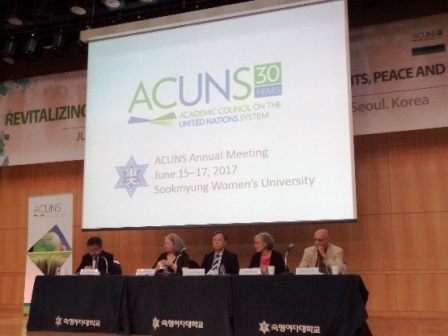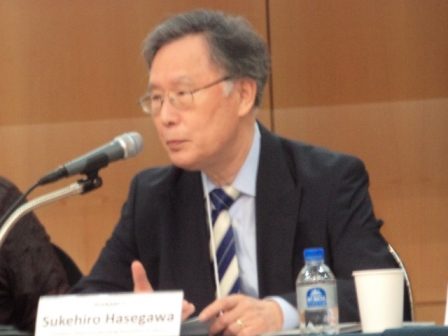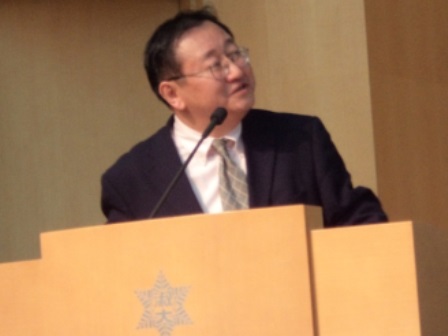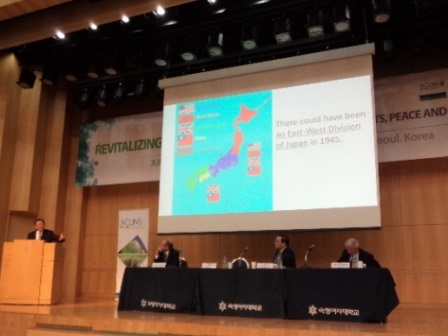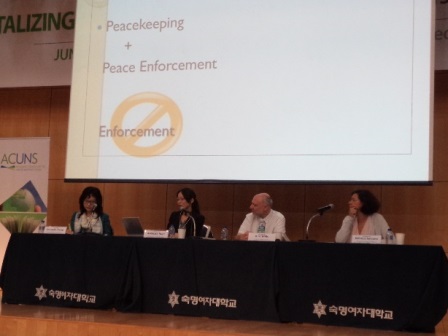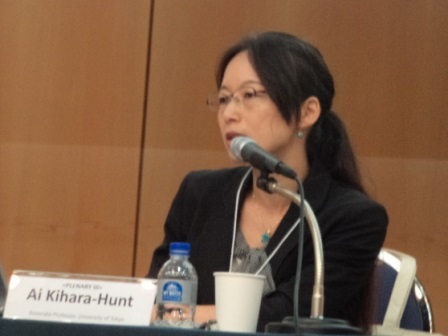In plenary sessions, Professors Hoshino of Osaka University and Kihara-Hunt of Tokyo University joined Hasegawa in making presentations at the Plenary Sessions on the Role of the UN in the Future of the Korean Peninsula, Promotion of Human Rights in Humanitarian Crises.
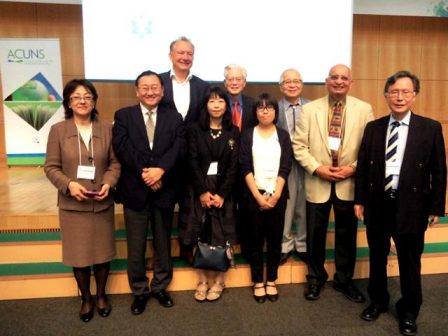
Plenary meeting program
THURSDAY, JUNE 15, 2017
8:00 am REGISTRATION Location: Centennial Hall, 2nd Floor
9:30 am – 10:30 am OPENING CEREMONY
WELCOME REMARKS
Hyun In-Taek, Former Minister of Unification; Chairperson of Local Preparation Committee
Lorraine Elliott, Chair, ACUNS; Professor, Australian National University
KEYNOTE ADDRESS
“Saving Multilateralism in a Unilateral World”
Han Seung-Ju, Former Minister of Foreign Affairs
10:30 am – 11:00 am COFFEE BREAK
11:00 am – 12:30 pm PLENARY I
ACUNS at 30: Retrospect and Prospect
Moderator: Kyu-dok Hong, Professor, Sookmyung Women’s University
Panelists: Lorraine Elliott, Chair, ACUNS; Professor, Australian National UniversitySukehiro Hasegawa, President, Global Peacebuilding Association of JapanCharlotte Ku, Professor of Law, Texas A&M University School of LawRamesh Thakur, Director, Centre for Nuclear Non-Proliferation and Disarmament, Crawford School, Australian National University
In his presentation, Professor Hasegawa first explained how the three Asian academic councils emerged. Japanese and Korean academic councils established in the late 1990’s. Japan Association for the UN Studies (JAUNS) and the Korean Academic Council on the UN System (KAKUNS) held its first seminar first in Seoul in 2001 and In 2010, the UN Association of China sent a delegation to Seoul where KACUNS. China established the Chinese Academic Net for United Nations Studies (CANUNS) and joined formally in the Asian Seminar on the UN System held in Osaka, Japan in 2011. Hasegawa admitted the Asian group followed ACUNS lead in establishing agenda for discussion in the past and called for more Asian participants to join and voice more actively their views and opinions at ACUNS Seoul conference and contribute more to the management of ACUNS.
12:30 pm – 2:00 pm LUNCH BREAK
2:00 pm – 3:30 pm WORKSHOP PANELS: SESSION I
4:00 pm – 5:30 pm PLENARY II
The Role of the UN in the Future of the Korean Peninsula
Moderator: Thomas Biersteker, Curt Gasteyger Professor of International Security and Conflict Studies, The Graduate Institute, Geneva
Panelists: Toshiya Hoshino, Professor, Osaka UniversitySung-han Kim, Professor and Dean, Graduate School of International Studies, Korea UniversityXuexian Wang, Former Deputy Director-General, Department of International Organizations and Conferences, Ministry of Foreign Affairs; Former Deputy Permanent Representative of China to the United Nations; Former Ambassador to South Africa
In his presentation, Professor Hoshino explained the impact of possible North Korean missile attacks on Japan.
6:00 pm – 8:00 pm WELCOME RECEPTION
Hosted by Kihak Sung, Chairperson and CEO of Youngone Corporation
FRIDAY, JUNE 16, 2017
9:00 am – 10:30 am PLENARY III
Protection and Promotion of Human Rights in Humanitarian Crises
Moderator: Eunsook Chung, Senior Research Fellow, Sejong Institute
Panelists: Mely Caballero-Anthony, Associate Professor, Nanyang Technological UniversityMarzuki Darusman, UN Commission on Human Rights in North KoreaAi Kihara-Hunt, Associate Professor, University of TokyoKurt Mills, Professor, University of Dundee
Professor Kihara-Hunt presented the result of her research that UN police officers commit serious crimes, but mostly while not on duty. Whether officers commit crimes appears to be linked more to their personal integrity than their functions. In the main, they are not being called to account. In addition, the UN is not effective in generating information fit for use in criminal proceedings. However, the laws on jurisdiction and immunity do not constitute legal barriers to accountability, although immunity poses some problems in practice. The principal problem appears to be the lack of political will to bring prosecutions. The finding that States, and arguably the UN, have an obligation to investigate and prosecute crimes may encourage prosecution.
10:30 am – 11:00 am COFFEE BREAK
11:00 am – 12:30 pm WORKSHOP PANELS: SESSION II
12:30 pm – 2:00 pm LUNCH BREAK
2:00 pm – 3:30 pm JOHN W. HOLMES MEMORIAL LECTURE
“A Pivotal Moment in Global Governance? Looking Back to Look Forward”
Margaret P. Karns, Visiting Professor, Center on Governance and Sustainability, University of Massachusetts Boston; Professor Emeritus, University of Dayton
4:00 pm – 5:30 pm PLENARY IV
Agenda 2030 – Achieving Progress towards the SDGs
Moderator: Otto Spijkers, University Lecturer, Utrecht University School of Law
Panelists: Stephen Browne, Co-founder, Future UN Development System; Visiting Lecturer, Graduate Institute GenevaModesto Seara Vazquez, Rector, Oaxaca State University SystemHaibin Zhang, Professor, School of International Studies, Director of the Center for International Organization Studies, Peking University
6:00 pm – 8:00 pm DINNER
Sponsored by Korean Ministry of Foreign Affairs
SATURDAY, JUNE 17, 2017
9:00 am – 10:30 am WORKSHOP PANELS: SESSION III
10:30 am – 11:00 am COFFEE BREAK
11:00 am – 12:30 pm PLENARY V
Agenda for the New Secretary-General
Moderator: Ingvild Bode, Lecturer, University of Kent
Panelists: Karin Abbor-Svensson, Programme Manager for ‘Hammarskjöld’s Legacy’, Dag Hammarskjöld FoundationJoon Oh, Professor, Kyung Hee University; Former Ambassador, Republic of KoreaFrancesco Mancini, Assistant Dean and Visiting Associate Professor, National University of SingaporeSebastian von Einsiedel, Director, UN University – Centre for Policy Research
12:30 pm – 1:00pm CLOSING REMARKS
Kyu-dok Hong, President of KACUNS; Professor, Sookmyung Women’s UniversityLorraine Elliott, Chair, ACUNS; Professor, Australian National UniversityRoger Coate, Paul D. Coverdell Professor of Public Policy, Georgia College; Distinguished Professor Emeritus, University of South Carolina
WORKSHOP PANELS: SESSION I
Thursday, June 15 2:00 pm – 3:30 pm
Panel 1–1Comparative Analysis of the Peace-Continuum: Linking Relief, Recovery, and Conflict Prevention
Moderator: Chigumi Kawaguchi, Research Fellow, JICA Research Institute
Panelists: Hiromu Miyashita, Research Associate, Waseda University (Humanitarian Assistance after the World Humanitarian Summit)Yukako Sakabe Tanaka, Research Associate, Waseda University (Should the ‘Continuum’ for Peacebuilding Focus on Development or Conflict Prevention?: The Case of Timor-Leste)Ryoji Tateyama, Emeritus Professor, National Defense Academy of Japan (The Syrian Civil War: Politicization of Crisis and Challenges and Dilemmas for Humanitarian Response)
Panel 1–2Prevention as the Priority for Revitalizing the UN
Moderator: Heung-Soon Park, Professor, Sun Moon University
Panelists: Tadanori Inomata, Visiting Professor, United Nations University for the Institute for Advanced Study of Sustainability (Promoting Culture of Prevention – Ensuring Necessary Resources and Management Capacities)Michiko Kuroda, Visiting Professor, Mercy College (Conflict Prevention – Operational Perspectives)Sumihiro Kuyama, Board Member, UNA-Japan (Reviewing the Norms and Practices on Conflict Prevention)
Discussant: Tatsuro Kunugi, Board Member, UNA-Japan; Deputy Representative, Earth Charter Japan Committee
Panel 1-3The Role of NGOs for Supporting Human Rights Activists/Writers in North Korea
Moderator: Hee Youn Do, Representative, Toward Happy Unification
Panelists: Goo Yong Lee, Representative, KL Management (North Korean Human Rights Viewed from the Viewpoint of Literature)Kwang Jin Kim, Research Commissioner, Institute for National Security Strategy (Accusation of Bandi and Problems of the International Community)
Panel 1–4Building Peace: Actors, Issues, and Strategies Peacekeeping as a Response to Human Security Threats
(*These presentations have been supported as part of the Korea Working Group for Human Security of the Meridian 180 project.)
Moderator: Antonietta Elia, Senior Lecturer in Law, University of Santiago
Panelists: Brendan Howe, Professor, Ewha Womans University (Normative Constraints in Peacekeeping)Boris Kondoch, Professor, Far East University (Legal Challenges to UN Peacekeeping Operations)Otto Spijkers, University Lecturer of Public International Law, Utrecht University (Accountability and Immunity of Peacekeepers)
Panel 1–5UN Security Council Reform: Reform and Representation
Moderator: Mary Farrell, Professor, Plymouth University
Panelists: Khushboo Chauhan, Doctoral Candidate, Jawaharlal Nehru University (The United Nations Security Council and Reforming the Power to Veto: The Discrepancy between International Law and International Politics with Special Reference to Genocides)Rafael Cunha, PhD Candidate, Escola de Comando e Estado-Maior (The new global governance and regional representativeness in the United Nations Security Council – an Asian and Latin American comparative approach)Thomas Doerfler, JSPS-UNU Postdoctoral Fellow, Centre for Policy Research, UN University (The Changing Global Order and the (Informal) Reform of the Security Council)
Panel 1–6Security, Human Rights, and North Korea
Moderator: TBC
Panelists: Yujin Jung, Graduate Candidate and Research Assistant, Hanyang University (The Feministic Approach of UN’s Humanitarian Aid Toward North Korea: Focusing on Gender- Sensitive Perspective)Brian Kim, Student Affiliate, East West Center and Yeseul Woo, Vasey Fellow, CSIS Pacific Forum (North Korean Human Rights Ought to be a Security Concern)Keira Koroma, MAGG Student, Balsillie School of International Affairs (Different Forms of Civil Society: The Link Between Koreas)Shahr-Yar Mahmoud Sharei, Executive Director, Center for UN Constitutional Research (North Korean Nuclear Disarmament and the United Nations Charter: Fit for Purpose?)
Panel 1–7The Role of International Society for Providing Development Assistance: How to Improve North Korean People’s Life Standard and Human Rights
Moderator: Chang Rok Seo, Professor, Korea University
Panelists: Katrin Maurer, Graduate Student, Sookmyung Women’s University (The Role of German Political Foundations in North Korea: Building Bridges to Pyeongyang)Jinsuk Byun, Professor, College of Law, Sookmyung Women’s University (Environmental Issues of North Korea)Yoo-Jin Rhee, Research Fellow, Korea Development Bank (North Korea’s Economic Development in the Perspective of Improving North Korean People’s Life Standard and Human Rights)
Discussants: Hubert Younghwan Lee, Executive Director, Transitional Justice Working GroupTae Eun Min, Research Fellow, Korea Institute for National Unification
Panel 1–8UN and Coping with Threats from Terrorism and Extremists
Moderator: Ambassador In-kook Park, President, Korea Foundation for Advanced Studies
Panelists: Hyeong-wook Boo, Research Fellow, Korean Institute for Defense Analysis (Terrorism Prevention Capacity Building; S. Korea’s Experience and Multi-national Cooperation)Intaek Han, Research Fellow, Jeju Peace Institute (Faces of Terrorism: A Statistical Exploration)Juri Kim, Researcher, Ewha Institute of Social Sciences (Global Efforts for Counter-Terrorism: Far from Perfect Harmony)Jeongmin Seo, Professor, Hankuk University of Foreign Studies (Push and Pull Factors of Extremism in Korea and the Middle East)
Panel 1–9The Protection of Rights of Overseas Labor/Global Compact
Moderator: Ambassador Sukbum Park, Secretary General, UN Global Compact Network Korea
Panelists: Youngjin Choi, Assistant Professor, Kyung Hee University (International Migration in Japan and Korea: Patterns, Policy and Problems)Hyo-won Yoon, Consultant, IndustriALL Global Union (Rights of Overseas Labor and Social Responsibility of Korean Corporates)
Discussant: Hyoung Koo Moon, Professor, Korea University Business School
Panel 1–10UN and the Strengthening of Non-Proliferation Regime
Moderator: Yong Sub Han, Professor, Korean National Defense University
Panelists: Kuyoun Chung, Research Fellow, Korea Institute for National Unification (US Nuclear Posture and the Determinant of International Commitment on Nuclear Security)Bong-Geun Jun, Professor, Korea National Diplomatic Academy (Strengthening Global Nuclear Security Governance)
WORKSHOP PANELS: SESSION II
Friday, June 16 11:00 am – 12:30 pm
Panel 2–1Integration of Cultural Perspectives into UN’s Policy Enterprise
Moderator: Sung-Hack Kang, Professor Emeritus, Korea University
Panelists: Tatsuro Kunugi, Board Member, UNA-Japan; Deputy Representative, Earth Charter Japan Committee (Promotion of Cultural Goals, e.g. R2P and Nuclear Disarmament, as UN’s Public Policy)Miki Sugimura, Vice President, Global Academic Affairs; Professor of Faculty of Human Sciences, Sophia University (Inclusion and Equity in Debate: Some Comparative Points on Education in a Multicultural Society)Jiao Zhang, Lecturer, East China University of Political Science and Law (Women, Peace and Sustainable Development—with Emphasis on the Implementation of the Security Council Resolution 1325)
Discussants: Takeo Uchida, Visiting Researcher, Chuo University
Panel 2–2Issues of Human Rights and Minority Rights: Cause of Conflict or Result of Conflict
Moderator: Francesco Mancini, Assistant Dean and Visiting Associate Professor, Lee Kuan Yew School of Public Policy, National University of Singapore
Panelists: Antonietta Elia, Senior Lecturer in Law, University of Santiago (Eroding a Wall: The United Nations Commission of Inquiry on Democratic People’s Republic of Korea)Ayako Inokuchi, MA Student, Osaka University (Conflict Mineral Regulation and the UN Commitment- What has Been Done, and What Should be Done)Masataka Tamai, PhD, Ritsumeikan University (Minority Rights Regime in the OSCE and UN)Takashi Yamakawa, PhD, Ritsumeikan University (Does Monitoring Matter? UNDP and the Decade of Roma Inclusion)
Panel 2–3The UNSC in Practice: Legitimacy and the Prospects for Informal Reform
Moderator: Thomas Biersteker, Curt Gasteyger Professor of International Security and Conflict Studies, The Graduate Institute, Geneva
Panelists: Bola Adediran, PhD Candidate, The University of Manchester (Legislating Restraint: Why the Code of Conduct Idea is Problematic)Vickie Frater, Research Officer and Tutor, University of Queensland (Prosecutors, Defendants, Judges and Jurors: Security Council Contestation and Syria)Jess Gifkins, Senior Lecturer, Leeds Beckett University (Everyday Legitimation: Legitimacy in the Practice of UN Security Council Decision-making)Niels Nagelhus Schia, Senior Research Fellow, Norwegian Institute of International Affairs (The UN Security Council: Balancing Relevance, Legitimacy and Efficiency)
Panel 2–4Peacekeeping and Peacebuilding: Measuring and Improving Outcomes
Moderator: Roger Coate, Paul D. Coverdell Professor of Public Policy, Georgia College; Distinguished Professor Emeritus, University of South Carolina
Panelists: Laura Bosco, PhD Candidate, American University (Resolve and the Protection of Civilians in UN Peacekeeping)Henry (Chip) Carey, Associate Professor, Georgia State University (Evaluating the Peacebuilding Consequences of the UN Stabilization Mission in Haiti (MINSTAH), 2004-2017)Yin He, Associate Professor, China Peacekeeping Police Training Center (UN Peacekeeping)Woojeong Jang, PhD Student, Georgetown University (Trust after War: UN Multidimensional Peacekeeping and Peacebuilding Outcomes in Sierra Leone and Namibia)
Panel 2–5International Law and Human Rights
Moderator: Khushboo Chauhan, Doctoral Candidate, Jawaharlal Nehru University
Panelists: Mokbul Ahmad, Assistant Professor, Asian Institute of Technology (Poverty and Human Rights: Determining the Relationship on the Basis of Conceptual Frameworks)Rekha Datta, Professor, Monmouth University, Kaitlin Allsopp, Student, Monmouth University, and Katie Cikovsky, Student, Monmouth University (The United Nations and Women’s Rights as Human Rights: Examining How CEDAW Impacts National Policies to Combat Gender Based Violence in Rwanda and Sudan)Ben Hudson, PhD Candidate, University of Bristol (Realising IDP Return: Challenges in Law and Implementation)Shinya Ito, PhD Candidate, The University of Tokyo (Mainstreaming Human Rights in the Age of Sustainable Development: What Role for International Law?)
Panel 2–6The UN and Contemporary Human Rights Challenges
Moderator: Joel Oestreich, Professor, Drexel University
Panelists: Woong Shik Choi, Master’s Candidate, International Law, Seoul National University (Repositioning the Human Rights Council within the UN System: Its Proper Place and Relationship with the General Assembly and Security Council)Marcella Ferri, Adjunct Professor, University of Bergamo (The Real Impact of Human Rights Monitoring Bodies’ Activities: An Appraisal and Some Future Prospects)Marina Ghosh, MIPP Student, Balsillie School of International Affairs (Human Rights Cities: A Governance Model for the Future of Asian Urbanization)Xin Ren, Professor, California State University (Save Our Children: Sex Trafficking of Minors and Child Prostitution)
Panel 2–7Delivering on Development
Moderator: Stephen Browne, Co-founder, Future UN Development System; Visiting Lecturer, Graduate Institute Geneva
Panelists: Michael Fleet, MAGG Student, Balsillie School of International Affairs (The Sustainable Development Goals and Project Efficacy: Recognizing Overlap and Designing Collaborative Policies)Barbora Ruzickova, PhD Candidate, University of Economics in Prague (Shortcomings of SDGs and their Links to the Population Growth)Toshihiro Tanaka, PhD Candidate, Waseda University (A Bridge Over Troubled Water: UN System Coherence for Delivering Results)Jeremy Wagner, MIPP Student, Balsillie School of International Affairs (The SDGs and the Changing Face of Hunger: What Happened to Urban Food Security?)
Panel 2–8East Asian Contributions to UN Peacekeeping: China and Korea
Moderator: Otto Spijkers, University Lecturer of Public International Law, Utrecht University School of Law
Panelists: Sunghee Cho, PhD Candidate, Syracuse University (China’s Participation In UN Peacekeeping Operations Since 2000)Goosoon Kwon, Assistant Professor, Seoul Cyber University (Result Based Evaluation Model and Its Application to Peace Operation of the ROK Military Contingent to UN Mission)Mangzamuan, PhD Candidate, Jawaharlal Nehru University (A Responsible Middle Power?: Evaluating Republic of Korea’s Contributions to UN Peacekeeping Operations)Xuemeng Sui, Student, Zhejiang University and Ming Wu, Student, Zhejiang University (Analysis of China’s Share of UN Budget in History)
Panel 2–9The United Nations and North Korea
Moderator: Sung-han Kim, Professor & Dean, Graduate School of International Studies, Korea University
Panelists: Kyung Yon Moon, Assistant Professor, Chonbuk National University (20 Years of Aid to North Korea: Special Reference to UN Institutions)Ji-Youn Park, Research Fellow, Export-Import Bank of Korea (Unintended Consequences of UN Sanctions: Lessons for Economic Sanctions Towards North Korea)
Panel 2–10Sharing Experiences of Teaching Global Citizenship Education (GCED) Courses in Higher Education Institutions (HEIs): 3 Universities in the Republic of Korea
Moderator: Heung-Soon Park, Professor, Sun Moon University
Panelists: Utak Chung, Director, Asia-Pacific Centre of Education for International Understanding (GCED Course Development in Higher Education Institutions (HEIs))Dong Ju Choi, Professor, Sookmyung Women’s University (Sharing the Experience of Running “Global Citizenship & International Development Course”)Kyung-koo Han, Professor, Seoul National University (Active Learning through Acting and Documenting: GCED through Smart Phone)Soon-Yong Pak, Professor, Yonsei University (Global Citizenship and Education for International Understanding (EIU), a Course Taught at the Department of Education, Yonsei University)
Panel 2–11Maritime Security and Law in East Asia
Moderator: Seo-Hang Lee, President, Korea Institute for Maritime Strategy
Panelists: Sam-Man Chung, Research Director, Korea Institute for Maritime Strategy (Naval Activities in the EEZ in East Asia: Feasibilities and Limits)Suk-Kyoon Kim, Former Commandant, Korea Coast Guard (Challenges to Combating Piracy in East Asia: Revisit to Regional Cooperation)
Discussant: Ki-Joo Kim, Senior Researcher, Korean Institute for Defense AnalysisDeok-Ki Kim, Professor, Chungnam National UniversityKiljoo Ban, Chief, International Relations Department at the ROK Naval Academy
Panel 2–12Enhancing the UN PKO’s Capacity and Regional Cooperation
Moderator: Young-Ho Kim, Director-General, Research Institute of National Security Affairs
Panelists: Brendan Howe, Professor, Graduate School of International Studies, Ewha Womans University (Enhancing Capacity and Regional Cooperation in the Promotion of Human Security: Korea’s Contributions in Southeast Asia)Boris Kondoch, Professor, Far East University (Regional Responses to Traditional and Non-Traditional Security Threats: The Case of North Korea)Soon Hyang Park, Professor, Peacekeeping Operations Center, Korea National Defense (Enhancing the UN PKO’s capacity-focusing on the Korean Military Participation in UN PKO)
Panel 2–13UN and Regional Cooperation in the Fight against Diseases
Moderator: Dong-il Ahn, Professor, Yonsei University; Former WHO Cambodia Country Director
Panelists: Semee Yoon, Professor, Yonsei University (Health and Development, Poverty and Disease, Designing and Financing a Primary Health System in Low-income settings)Sangchul Yoon, Director, Center for Global Health and Innovations, National Medical Center of Republic of Korea (To Leave no one Behind for Essential Health Service: mHealth/eHealth in Developing Countries)
Discussants: Shin Ki Ahn, Professor, Yonsei University; Director of SDG CenterJin Sung Song, Health Specialist, Korea International Cooperation Agency
Panel 2–14A “Surge in Diplomacy for Peace”? Revitalizing the United Nations in the Field of Good Offices, Preventive Diplomacy and Mediation
Moderator: Karin Abbor-Svensson, Programme Manager, Dag Hammarskjöld Foundation
Panelists: Manuel Fröhlich, Professor, University of Trier (When Does it Become Personal? Mediation efforts by the Secretaries-General)Henning Melber, Senior Advisor and Director Emeritus, Dag Hammarskjöld Foundation (Remembering a “Surge”: Conditions for Success in Namibia)Sebastian von Einsiedel, Director, United Nations University Centre for Policy Research (Fit for purpose? The UN’s Mediation Infrastructure)
Panel 2-15Environmental Protection and the Role of Global Climate Fund
Moderator: Sung-hwan Son, Visiting Professor, Hankuk University of Foreign Studies, Former Ambassador of Climate Change
Panelists: Suh-Yong Chung, Professor, Korea University (Role of Climate Finance: Implementations for Developing Countries’ NDCs)Jin-Young Moon, Research Fellow, Korea Institute for International Economic Policy (Issues on Climate Finance in the UNFCCC Negotiations)
Discussants: Byungseol Byun, Professor, Inha UniversitySeonjou Kang, Associate Professor, Korea National Diplomatic Academy
WORKSHOP PANELS: SESSION III
Saturday, June 17 9:00 am – 10:30 am
Panel 3-1The Value of Values: How to Revitalize the Integrity of the UN Civil Servant?
Moderator: Karin Abbor-Svensson, Programme Manager, Dag Hammarskjöld Foundation
Panelists: Manuel Fröhlich, Professor, University of Trier (The United Nations, Political Ethics and Personal Integrity)Henning Melber, Senior Advisor, Director Emeritus, Dag Hammarskjöld Foundation (Hammarskjöld and Integrity of the International Civil Servant – The Importance of Leading by Example)Ramesh Thakur, Professor, The Australian National University (How Can the UN Change its Organisational Culture? Initiatives, Mechanisms, Engagement – Are We (not) There Yet?)
Panel 3–2
Moderator: Otto Spijkers, University Lecturer of Public International Law, Utrecht University
Panelists: Gabriel Amvane, Legal Officer, CADA Jean Chaumien – Horizon amitié (Peace and Democracy in States’ Internal Affairs)Adewale Bakare, Ahmadu Bello University Zaria (The Next-core of Global Governance Model Unveiled: The Synthesis of Open Globalization and Testing of a Built Intercontinental System)Soyoung Kwon, Professor, George Mason University and Roland Wilson, Professor, George Mason University (Institutionalizing Conflict Analysis and Resolution)Thomas Walsh, President, Universal Peace Federation (The UN Mission and the Growing, Evolving Relevance of Religion and Interreligious Dialogue)
Panel 3–3Sovereignty and Intervention: R2P and Initiatives for Peace
Moderator: Thomas Biersteker, Curt Gasteyger Professor of International Security and Conflict Studies, The Graduate Institute, Geneva
Panelists: Priyanka Bahl, MAGG Student, Balsillie School of International Affairs (Pressing Challenges to the UN’s Protection Agenda: R2P and the Rise of Nationalism)Subhash Birla, President, International Jurist Organization (UN Action in use of Force for Human Rights, Peace & Security)Young-Dahl Oh, Professor, Chungnam National University (The Sovereignty-Human Rights Nexus: Justifications for R2P in the History of Political Ideas)
Panel 3–4Idea(s) of Development
Moderator: Mary Farrell, Professor, Plymouth University
Panelists: Albert Denk, PhD Candidate and Research Assistant, LMU Munich & TU Munich (Negotiating the Sustainable Development Goals)Takiyah Harper-Shipman, PhD Candidate, University of Connecticut (What’s Left to Own?:Moving Beyond Ownership of Development in Aid-dependent Africa)Devin Joshi, Associate Professor, Singapore Management University (Human Development and the UN(DP): The Formation of a Centrist Counter-Ideology)Joel Oestreich, Professor, Drexel University (The World Bank’s Equity Agenda After Ten Years)Elham Seyedsayamdost, Chair, International & Middle Eastern Studies, American University in Dubai (Development in Light of Western Nationalist Movements)
Panel 3–5Refugee and Migrant Protection
Moderator: Kurt Mills, Professor, University of Dundee
Panelists: Henry (Chip) Carey, Associate Professor, Georgia State University (The Two-Level Global Governance of Regular and Forced Migration and Asylum)Olivia Matthews, MIPP Student, Balsillie School of International Affairs (Innovative Financing Solutions for International Refugee Responsibility-Sharing)Ralph Wilde, Law Faculty, University College London (Unintended Consequences: Do Progressive Legal Developments Protecting Forced Migrants Undermine Protection in Other Areas?)Andrew Wolman, Professor, Hankuk University of Foreign Studies (Humanitarian Protection and the Reframing of Refugee Advocacy in East Asia)Chenxi Yang, Assistant Research Fellow, China Institute of International Studies (Refugees and Mass Migration)
Panel 3–6Perspectives on UN Leadership
Moderator: Kent Kille, Professor, The College of Wooster
Panelists: Ingvild Bode, Lecturer in International Relations, University of Kent (Women, Leaders, or Women Leaders? Narrating Experiences of Gender (In)equality in the United Nations Secretariat)Marcel Jesenský, Professor, University of Ottawa and Carleton University (Fascinating Mystery: Selection of the UN Secretary-General)Marcel Jesenský, Professor, University of Ottawa and Carleton University (All Around the World: Official Travels of the UN Secretary-General)
Panel 3–7Island States and Agency in Global Governance
Moderator: John Gamble, Professor, Penn State Behrend College
Panelists: Nicholas Chan, Sessional Lecturer, Monash University Malaysia (Large Ocean States’: Small Islands, Sovereignty, and the New Politics of Global Biodiversity Conservation)Thom Woodroofe, PhD Candidate, University of Oxford (Does Size Matter: The UN’s Smallest Island Members)
Panel 3-8The Role of International Society for Protecting Human Rights of North Korea: COI and Its Impact
Moderator: Seong Ho Jhe, Professor, Chung Ang University Law School
Panelists: Young Hoon Song, Professor, Kangwon National University (The Promotion of North Korean Human Rights and International Politics)Jung-hyun Cho, Professor, Hankuk University of Foreign Studies Law School (North Korean Human Rights Violation and Ensuring Individual Accountability)
Discussants: Representative TBC, International Organizations Bureau, Ministry of Foreign AffairsBuhm-Suk Baek, Professor, Kyung Hee University
Panel 3-9Current Missile and Nuclear Threats of North Korea and Role of the United Nations
Moderator: Woo Taek Hong, Research Fellow, Korea Institute for National Unification
Panelists: Wootae Lee, Research Fellow, Korea Institute for National Unification (Arms Control Strategy for the Peaceful Security Environment in the Korean Peninsula)Boram Kwon, Research Fellow, Korean Institute for Defense Analysis (Reassessment of Non-proliferation Sanction)Takeuchi Maiko, Member, Panel of Experts, United Nations Security Council (UN Panel of Expert’s Role: How to Cope with Nuclear and Missile Threats)Jinsuk Byun, Professor, Sookmyung Women’s University (US sanctions against North Korea: combination of Unilateralism and Multilateralism)
Panel 3-10Human Rights and the Politics of Identity: Individual and International Expressions
Moderator: Rekha Datta, Professor, Monmouth University
Panelists: Roger Coate, Paul D. Coverdell Professor of Public Policy, Georgia College; Distinguished Professor Emeritus, University of South Carolina (Revitalizing the United Nations to Deal with Crises over Identity Politics)Jeffrey A. Griffin, Doctoral Candidate, University of Nevada and Robert L. Ostergard, Associate Professor and Director of Graduate Studies, University of Nevada (Human Rights Discrimination, the United Nations, and the Politics of Identity)Elena Taborda, Doctoral Student, University of Massachusetts Boston (International Students in the U.S.: An Invisible Army of Exploited Workers)
Panel 3-11The Role of UNC: Past, Present and the Future
Moderator: Bong-hyun Kim, Former Ambassador of Korea to Australia
Panelists: Sangbeom Yoo, Associate Professor, Korea National Defense University (Future Role of the United Nations Command)Gibum Kim, Researcher, Korea Institute for Defense Analysis (Thoughts on Adjusting the Roles and Function of the UNC after the Wartime OPCON Transfer)
Panel 3-12East Asia and the United Nations: Regional Peace and Cooperation and the Role of the UN
Moderator: Kyu-dok Hong, Professor, Sookmyung Women’s University
Panelists: Heung-Soon Park, Professor, Sun Moon University (Another East Asian Paradox?: An Emerging Role and Rivalry of East Asian Nations in the UN System and its Impact and Implications)Hyun Jin Choi, Assistant Professor, Kyung Hee University (Regional Territorial Conflicts and Historical Legacy in East Asia)Young Hoon Song, Professor, Kangwon National University (Human Rights, Refugees and Humanitarian Problems in East Asia)
Panel 3-13Protecting Women from Sexual Violence: How to Sustain Peace through Education
Moderator: TBC
Panelists: So-Jin Park, Professor, Sookmyung Women’s University (Prevention and Resolution of Sexual Violence: The Case of Educational field in Korea)Soon Hyang Park, Professor, Korean National Defence University (Prevention and Resolution of Sexual Violence: the Case of UN Peacekeeping Force)
Discussant: Mijeong Lee, TBC
Panel 3-14UN and the Protection of the Rights of the Persons with Disabilities
Moderator: Joon Oh, Professor, Kyung Hee University; Former Ambassador, Republic of Korea
Panelists: Hyung Shik Kim, Social Policy Member, UN Disability Right Committee (UN and the Protection of the Rights of the Persons with Disabilities: CRPD [Convention on the Rights of Persons with Disabilities])Mi Yeon Kim, President, Women with Disability Arts and Cultural Network (Gender Frame on UN and the Protection of the Rights of the Persons with Disabilities)


